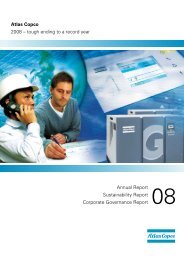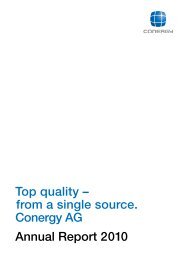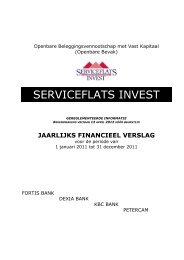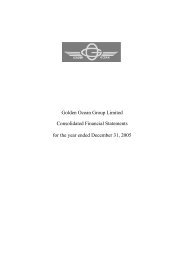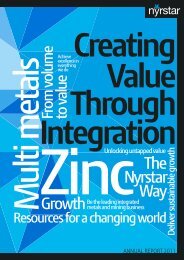Punch Taverns plc 2011 Annual Report
Punch Taverns plc 2011 Annual Report
Punch Taverns plc 2011 Annual Report
You also want an ePaper? Increase the reach of your titles
YUMPU automatically turns print PDFs into web optimized ePapers that Google loves.
<strong>Punch</strong> <strong>Taverns</strong> <strong>plc</strong><br />
<strong>Annual</strong> <strong>Report</strong> and Financial Statements <strong>2011</strong><br />
29<br />
Other areas of responsibility include:<br />
• consideration of the Company’s succession plans which are<br />
in place for Board members and the senior management team;<br />
• the identification, evaluation and nomination of candidates<br />
to fill Board vacancies;<br />
• reviewing Directors’ conflicts of interests and making<br />
recommendations to the Board to authorise such conflicts<br />
where applicable;<br />
• regularly reviewing the membership of the Company’s<br />
committees to ensure that undue reliance is not placed upon<br />
certain individuals; and<br />
• making recommendations in respect of Board re-election<br />
by shareholders.<br />
Tony Rice chaired the Nomination and Governance Committee<br />
meeting at which candidates for the appointment as successor<br />
of the Chairman of the Board were discussed, and at which an<br />
appointment was recommended.<br />
All Non-executive Directors are appointed for specified terms<br />
subject to re-election and to statutory provisions relating<br />
to the removal of a Director. Any term beyond six years for a<br />
Non-executive Director is subject to particularly rigorous review<br />
and should take into account the need for progressive refreshing<br />
of the Board. Ian Fraser was appointed in September 2004 and<br />
has therefore exceeded the six-year term; following the number<br />
of Board changes at demerger, however, it is felt that Ian should<br />
stand for re-election to ensure continuity on the Board.<br />
When considering new appointments the Company has a formal,<br />
rigorous and transparent procedure which is based on merit<br />
and assessed objective criteria. The Nomination and Governance<br />
Committee evaluates the balance of skills, knowledge and<br />
experience required and prepares a description of the role<br />
and capabilities required. Before any appointment is made the<br />
Committee obtains details of any interests the candidate may<br />
have which conflict or may conflict with the interests of the<br />
Company and considers whether, despite any such conflict,<br />
there are nevertheless grounds for recommending the candidate<br />
for appointment. This procedure was utilised during the period in<br />
the appointments of Ian Dyson and Steve Dando. In conjunction<br />
with an external recruitment agency, a job specification was<br />
drawn up, open advertising used and interviews undertaken<br />
by the Nomination and Governance Committee and other<br />
Non-executive Directors.<br />
Commitment<br />
Directors allocate sufficient time to the Company to<br />
discharge their responsibilities effectively.<br />
The terms and conditions of appointment of Non-executive<br />
Directors are available for inspection at the Company’s registered<br />
office during normal business hours and from 15 minutes prior<br />
to and during the Company’s <strong>Annual</strong> General Meeting (AGM).<br />
On appointment, the Company’s Non-executive Directors<br />
are informed of the expected time commitment that will be<br />
required and it is recommended that they set aside enough time<br />
to demonstrate satisfactory time commitment to their new role.<br />
Details of other commitments and potential conflicts of interest<br />
are disclosed to the Nomination and Governance Committee<br />
and approved before appointment, and any subsequent changes<br />
are notified to the Board. For the appointment of the Chairman,<br />
the Nomination and Governance Committee prepared a job<br />
description which included an assessment of the expected<br />
time commitment.<br />
Development<br />
All Directors should receive induction on joining the<br />
Board and should regularly update and refresh their<br />
skills and knowledge.<br />
On appointment, the Chairman together with the Company<br />
Secretary ensures that each Director receives a tailored induction<br />
programme that includes:<br />
• individual time with the Chairman, the Chief Executive Officer<br />
and other members of the Board;<br />
• meetings with the Company’s external advisers, substantial<br />
shareholders, brokers and lawyers;<br />
• an internal induction course which introduces the Group,<br />
its divisions and its employees;<br />
• visits to the Group’s leased pubs and those of competitors; and<br />
• external training courses, if required.<br />
The Chairman regularly reviews and agrees with each Director<br />
their training and development needs.<br />
Information and support<br />
The Board is provided with timely information in a<br />
form and of quality appropriate to enable it to discharge<br />
its duties.<br />
The Chairman, together with the Company Secretary, ensures<br />
that the Board receives accurate, timely and clear information.<br />
In preparation for every Board meeting, each Director receives<br />
documentation including a detailed report on current trading<br />
and full papers on matters where the Board will be required to<br />
make a decision or give its approval. These matters are discussed<br />
during the Board meeting, with the Chief Executive Officer<br />
and Finance Director giving an overview of how the Group is<br />
performing against expectations. In addition, the Board receives<br />
presentations from other members of senior management and<br />
external advisers to aid their understanding when applicable.<br />
All Directors, especially Non-executive Directors, have access<br />
to independent professional advice at the Company’s expense<br />
where it is judged necessary to discharge their responsibilities<br />
as Directors.<br />
All the Directors have access to the advice and services of the<br />
Company Secretary. The Company Secretary is responsible for:<br />
• ensuring that good information flows within the Board, its<br />
Committees and between the Non-executive Directors and<br />
senior management;<br />
• facilitating induction and assisting with professional<br />
development as required;<br />
• advising the Board, through the Chairman, on all governance<br />
matters;<br />
• providing assistance and information on corporate<br />
administration and legal matters; and<br />
• ensuring that Board procedures are followed and that all<br />
applicable legislation and regulations are complied with.<br />
The appointment and removal of the Company Secretary is a<br />
matter for the Board.<br />
Financial statements Governance<br />
Business review




